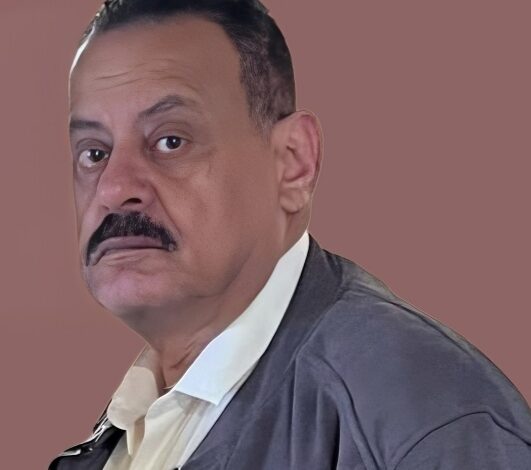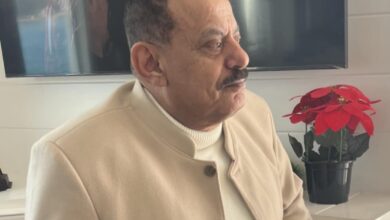On the Brink of Death

Yemeni mp
Ahmed Saif Hashed
As I previously mentioned, our small family in Aden consisted of my father, my mother, myself, and my twin sisters, Nour and Samia. We were a simple family, yet we were shadowed by the ominous presence of death, which lingered until it claimed the two blossoms of our lives. This left us steeped in sorrow that penetrated the depths of our souls and bodies.
Death arrived in a strange and mysterious manner, the cause and interpretation of which remain elusive even to this day. Something incomprehensible snatched my sisters from our midst, and I nearly became the third victim, were it not for divine grace. After claiming its prize, death departed, yet its heavy breath lingered in our home, refusing to fade away.
My sister Nour, not yet a year old, would suddenly erupt into loud and desperate cries. The moment she was held, she would quiet down, but placing her back on the ground or the bed would set her off again, her breath nearly escaping her. My father or mother would rush to comfort her, and she would cease her cries, often falling asleep in their arms. On one occasion, she cried out and did not regain her breath; she passed away instantly.
When my other sister, Samia, turned a little over a year old, the same scene unfolded. She exhibited the same condition and symptoms: crying suddenly without apparent reason, only to quiet down when held by my parents. Yet, when laid back down, she would erupt into another fit of loud cries, leading to her being scooped up once more until she eventually fell asleep in their arms.
About a year after Nour’s departure, Samia cried out again. My father rushed to carry her, but her breath faltered, and she died. To this day, we have not understood the cause of her death. Some claimed it was mere superstition, asserting that she died because our house was haunted by jinn, while others insisted she died of “joy.” What joy could that be when her deathly scream shattered the silence of our walls?
Nour’s life was brief and fleeting, with details that elude my memory, whereas I still remember Samia vividly, along with some details of her life. I would gently rock her to sleep in a cradle made of palm fronds, and during her waking hours, I played with her, finding companionship in my solitude. Samia was beautiful and radiant, yet her life, like her sister Nour’s, was ephemeral—like a moment of passionate love or a beautiful dream that passes swiftly and in haste.
* * *
I still recall my sister Samia lying on the bed after her death. My first glance left me bewildered, imbued with a sense of mystery and strangeness, as if I were seeing her for the first time. She lay there, without breath or movement, her silence enveloping me in a profound stillness.
After death took my sister Samia from us, I found myself in an unending search for her, weeping with profound sorrow and the bitter emptiness of loss. I would plead with my mother, “Look for her where she used to sleep; I cannot see her, and I haven’t found her! I want my sister; I want to play with her!”
My mother’s heart-wrenching pain could scarcely bear my anguished words. My insistence mingled with tears as I pressed my plea. At first, she appeared composed, enduring her suffering with quiet resilience. Yet, as she struggled to swallow her grief, her voice became shaky, punctuated by breaks and absences. She attempted to shield me from her sorrow, diverting my persistent questions into lighter topics.
However, her efforts were in vain, and suddenly, she collapsed into tears. Her cries flowed forth, abundant and searing, filled with deep anguish. In that moment, she cried, and I cried with her, not fully comprehending the reason for this outpouring of grief—this lavish and abundant display of tears brimming with salt and warmth. She then sought to comfort me through her sobs, trying to soothe both my pain and her own. She would tell me that Samia was in heaven, at peace, happy among the maidens of paradise, enjoying apples and all manner of fruit—everything I was deprived of in this fleeting world, she was relishing in the next.
As I grew older, I began to resent this mysterious death that steals away those we love. I would frequently ask my mother when the Day of Judgment would come, when I would be reunited with my sisters, Nour and Samia. I loathed death and the long separations it imposed. Strangely, she would say that siblings do not meet in the afterlife except on that day; after the Day of Judgment, there would be no reunion or connection between siblings, whether sons or daughters.
Perhaps my mother, or whoever conveyed this belief to her, intended to deepen the bonds of brotherhood and strengthen love among siblings in this world, where selfishness often prevails. For me, however, it signified a profound sorrow over an extended separation and an even deeper heartache over an eternal parting. I understood that I would see them only for one day—the Day of Judgment—before the separation returned for eternity, or for an endless time.
After more than eleven years, I contemplated suicide, yearning to escape this bleak world for the afterlife, to enjoy that blissful existence and compensate for all the deprivation I had endured here. However, the thought of leaving my mother alone to mourn the rest of her days pained me. I felt that departing without her would be a selfish act that tormented my conscience. Remaining, too, was a torment that seemed to perpetuate a cycle of suffering that would not cease.Yet, my mother’s love was immense, offering me solace and refuge. Thus, I chose to stay by my beloved mother’s side.
* * *
My mother was born in Aden, accompanied by a third sister whom she named Nadia. From birth, Nadia was afflicted with a mysterious and severe illness; her skin would peel and shed, and everyone awaited her inevitable demise from this enigmatic condition.
They whispered that she was a misfortune for our parents, a stark contrast to Nour and Samia, and even myself before them. Yet, against all odds, Nadia defied death and illness, although she seemingly struggled to conquer her own challenges.
Upon our return to the village, my profound attachment to my sister Samia, who had been taken from us by death and whom I had long sought in vain, intensified my longing. My fervent wish for the new baby to bear the name “Samia” aligned perfectly with my parents’ desire to break the string of misfortunes that had haunted us. Thus, they named her “Samia,” believing she would bring joy and dispel the shadows of past sorrows.
To me, the name “Samia” became a soothing balm for the haunting void left by the loss of my two sisters. This merciless and unfeeling death had robbed us of them, leaving an indelible mark on our hearts. The new “Samia” now occupies the place once held by my departed mother; she understands me more profoundly than I understand myself. She shares in my pain and aids in mending my wounds.
Samia diligently reads and memorizes the Quran, finding solace in its verses just as my mother once did. She prays for me day and night, enveloping me in her abundant compassion. She supports my patience and helps me navigate every hardship. She is the remedy I summon whenever heavy burdens weigh upon me, alleviating my suffering in moments of disappointment, pain, and sorrow.
In my childhood, Samia was a source of unwavering comfort and solace. In my adulthood, she has filled the vast emptiness left by my mother’s departure. This new Samia is delicate and ethereal, her warmth almost unbelievable, embodying sincerity itself. She is infused with grace, selflessness, and noble beauty.
* * *
Nour and Samia have departed this world, plunging us into an abyss of unending grief, leaving me teetering on the brink of becoming the third to vanish without return. Their absence has carved a profound void in our lives, a chasm that resists the balm of forgetfulness. This death, both mysterious and strange, claims no soul among us without a harrowing announcement that arrives unexpectedly, devoid of warning or preparation.
This dreadful specter descends upon us like a thunderbolt, snatching the spirits of those it touches, while the rest remain paralyzed in stunned silence, seized by a lingering terror. The space we inhabit mourns the loss that has settled in for eternity, saturated with an insatiable yearning and the daily reminders of absence and loss that persist.
As we entered this world, we cried out with sharp, piercing wails—a shared experience of every living birth. Yet, why were we singled out by death with a second cry that shattered the silence, leaving us and those around us questioning its significance? Was this cry a protest against our fates, or was it an enigmatic lesson, a hidden wisdom?
Death cleaves through time like a blade, and the cry cannot regain its breath. It ambushes our tender childhood with a “thunderbolt” that rends the heart, shattering the gears of forgetfulness, regardless of how many days elapse. It leaves our parents with a deep, gaping wound that refuses to heal, and sighs emerge from the very depths of the soul, saturated with sorrow, exhaling pain and fire. The ache penetrates deeply, like a knife in the heart, and memories remain within us, unyielding and steadfast, reminding us of the eternal separations we have endured—memories that evoke within us a flood of unrelenting sadness.
I have traversed the same horrific terrain as my departed sisters, yet I survived the “thunderbolt” of finality. The circumstances and symptoms are eerily similar, if not identical. I would suddenly scream, a sound like thunder, prompting my father or mother to rush to lift me from the ground. As soon as my feet touched the earth again, the screaming would return with renewed vigor. I would remain cradled in their arms until slumber claimed me, only to awaken at times, crying out once more, perpetuating a cycle that heightened my parents’ fears and anxieties about my potential departure from life.
Why did I scream in such a manner? Yes, the memory remains vivid, as if it occurred today rather than in some distant past; it is unforgettable, despite the passage of decades. Yet, I am left to ponder whether what I “witnessed” was reality or merely the hallucinations or visions of a troubled mind—something whose essence eludes me. I speak of a “vision” shrouded in ambiguity, filled with confusion and questions, wavering between illusion and reality, and marred by a cerebral affliction during a decisive moment still cloaked in mystery.
I cannot escape the haunting memories of what I once “witnessed.” The “scene” is etched in my mind like a floating anchor, its depths still unfathomable to me today. Perhaps science has offered explanations for such phenomena long ago, but I remained unaware or uninformed.
I was “watching” a white snake emerging from the abyss. It measured about a meter in length, with thick legs extending along its sides. Its head was square, proportionate to its body, and marked by round, expressive eyes. The width of its head was slightly greater than that of its body, and two dark, almost brown hairs swayed gently at the front of its head. This is how the experience unfolded before me, yet I remained oblivious to its true nature.
Suddenly, I would “see” it! It would crawl swiftly from the depths, sometimes at a startling speed. It twisted and circled around me, occasionally darting right before my eyes, prompting me to scream in sheer terror, just as my sisters had done before. My screams were fiery and explosive, nearly tearing through the walls—like a clap of thunder, arriving unexpectedly in a moment of distraction and bewilderment. This was a scream untethered to time, piercing through both night and day, revealing a “vision” of something dreadful and terrifying—something that split me in two with fear and horror.
When my father or mother would lift me into their arms, the snake would vanish into the depths. I could not comprehend how it disappeared, but it did! And when they set me back on the ground, I would see it once more, emerging from the concrete floor, crawling rapidly across the room. The scene would repeat, and with it, my heart-wrenching screams would erupt again. My parents took turns holding me until I fell asleep, but they could not see the creature; I was the only one who could “see” it.
Thus, they could not fathom the cause of my screams or the peculiar sight I was witnessing, even if there was some hidden revelation in my vision, despite how implausible its reality seems to me now.
On one occasion, the haunting scene of my screams replayed itself. When my father noticed the scribbles of a pen on my hand, he quickly wiped them away, and in that moment, my screams ceased; the creature vanished from sight. He interpreted this incident through the lens of prevailing cultural beliefs, concluding that I had inscribed the name
“Satan” on my hand. Yet, this explanation lacks conviction, for numerous instances unfolded with me, Samia, and Nour, devoid of any writing or scribbles.
The question persists: Have we wronged Satan?
Today, however, we have compounded our wrongs. We have come to bear witness to individuals who commit atrocities and heinous crimes—acts that warrant neither forgiveness nor absolution. These are the very people who have plundered their nations, inflicting suffering upon their own populations, unjustly devouring the salaries of their employees and the sustenance of their children, only to journey to Mecca to cast stones at the devil.
Corrupt and depraved, they trade in death, wreaking havoc upon the resources of a nation and the labors of its suffering people. They erect towering edifices and businesses from ill-gotten gains, the wealth of the devil, and brazenly inscribe upon their facades and doors, “This is from the grace of my Lord.”
What greater injustice and absurdity can we witness than this? It is a staggering and terrifying paradox, a reflection of a world turned upside down.
* * *
I, too, have felt the weight of desperation, racing against death as I fought to save my son, Fadi, from a severe asthma attack when he was nearly my age or perhaps a little older. The intensity of that moment remains etched in my memory—the suffocating darkness as my father struggled to rescue me from the jaws of death, a figure consumed by fear and panic.
The experience of thwarting death’s grasp, of preventing it from snatching your child away, is a visceral sensation that lingers, impervious to the passage of time. I have lived through such profound moments both as a child and as a father. My father rushed to save me from the imminent death that pressed heavily upon my eyelids.
There came a time when the doctor informed my father that my condition had deteriorated severely; I could no longer endure the injections and would not withstand the illness much longer.
Yet, with a flicker of hope, he chose to prescribe a treatment without needles. This endeavor felt akin to seeking a solitary beam of light in a dense, dark forest. Then, unexpectedly, a miracle emerged from the depths of despair—a surprise that shifted the impossible and pulled me back from the brink of death.
Gradually, my body began to respond to the treatment. My appetite surged, and my father brought home a pound of meat each day, which I devoured entirely, leaving nothing for anyone else. This is what my mother recounted to me later.
Whenever I was given a piece, I would soon return, pleading for another until I had consumed the last morsel my father had purchased. I can vividly imagine the joy radiating from my parents’ faces; my mother’s heart soared with happiness, while my father, overwhelmed by relief after a period of despair, beamed like a blooming lily on the balconies of a newlywed’s home. What a breathtaking and captivating feeling that was!
I not only survived but thrived, transforming into a mischievous and unruly child. I would tear down walls, scratch their surfaces, break the water pot, and hurl dining utensils about, shattering glass with reckless abandon. My mischief knew no bounds, as I tossed everything my hands could reach onto whatever caught my eye. My mother often wept over my antics; at times, she bore the burden of anger, punishing me harshly. My loud wails and raucous noise filled the house hour after hour, prompting complaints from neighbors and the landlord to my father about my disturbances. I became a nuisance not only to my family but to the entire neighborhood. My mischief, cries, and uproar never ceased.
* * *
After my father succeeded in uniting us under one roof in Aden, bringing our small family together in a modest home in Dar Saad, we were enveloped in the tranquility we had longed for.
Yet, this peace was abruptly shattered by the grotesque invasion of measles, a disease that wreaked havoc among children. Measles is an insidious virus, highly contagious and capable of leading to severe complications.
This illness was among the most prevalent during childhood. Its symptoms included a high fever, accompanied by a runny nose and cough, conjunctivitis, and a widespread rash. Although the measles vaccine was discovered in the 1960s, the disease remained rampant, only becoming rare in the early 1990s.
Regrettably, this virus has returned to Yemen with even greater ferocity, as we endure a period of despair that has become increasingly burdensome. Astonishingly, a brazen campaign has emerged to discourage the use of the vaccine, despite the staggering number of infections and tens of thousands of victims.
My first confrontation with this deadly virus took place in Aden, where it assailed me with fervor and determination, nearly overwhelming me. The nights stretched interminably, and the days felt like an eternity. Death loomed over my existence, while time seemed to crawl for my parents, as if it had come to a standstill, unwilling to depart our home before claiming my weary soul.
My parents poured every ounce of their strength into fortifying me against this malevolent virus, imploring it to withdraw without claiming the life of their child. They devised every strategy imaginable, striving to help me weather its peak and endure the agonizing moments of my suffering. How lethal and cruel this viral illness was, steeped in malice!
The eyes of my mother and father beseeched God with heart-wrenching compassion, praying fervently for my safety, that I might remain their cherished child. Each moment of waiting felt like an eternity, as they clung to the hope of a glimmer after despair had nearly engulfed them, yearning for survival just as the essence of life seemed to slip away. Each day I survived became a miracle, a testament to my tenacious instinct to cling to life—a stubborn resistance against the torturous death that threatened me and a testament to my struggle against a disease that expanded relentlessly.
The illness lurked with relentless ferocity, indiscriminately ravaging childhood, showing no mercy to the innocent.
Daily tragedies unfolded, often repeating within the same household multiple times within a short span. This virus of death made survival seem miraculous, as no impoverished home emerged unscathed, each having sacrificed a child’s spirit to its cruel grasp.
I fought against the measles, summoning every ounce of strength to resist and endure, aided by the advice of a neighbor who shared valuable insights with my mother, still inexperienced in navigating such crises. My mother benefitted from her neighbor’s knowledge on how to cope with the harsh realities of this illness. Ignorance can exacerbate a situation, becoming the first ally of the disease and potentially the primary cause of death before the illness itself, if precautions are not taken.
The forces of life converged, supporting one another against the onslaught of this virus, and I triumphed over the lurking specter of death that threatened me from beneath the surface of my skin and within the depths of my body. I recovered, gaining lifelong immunity against it.
* * *






